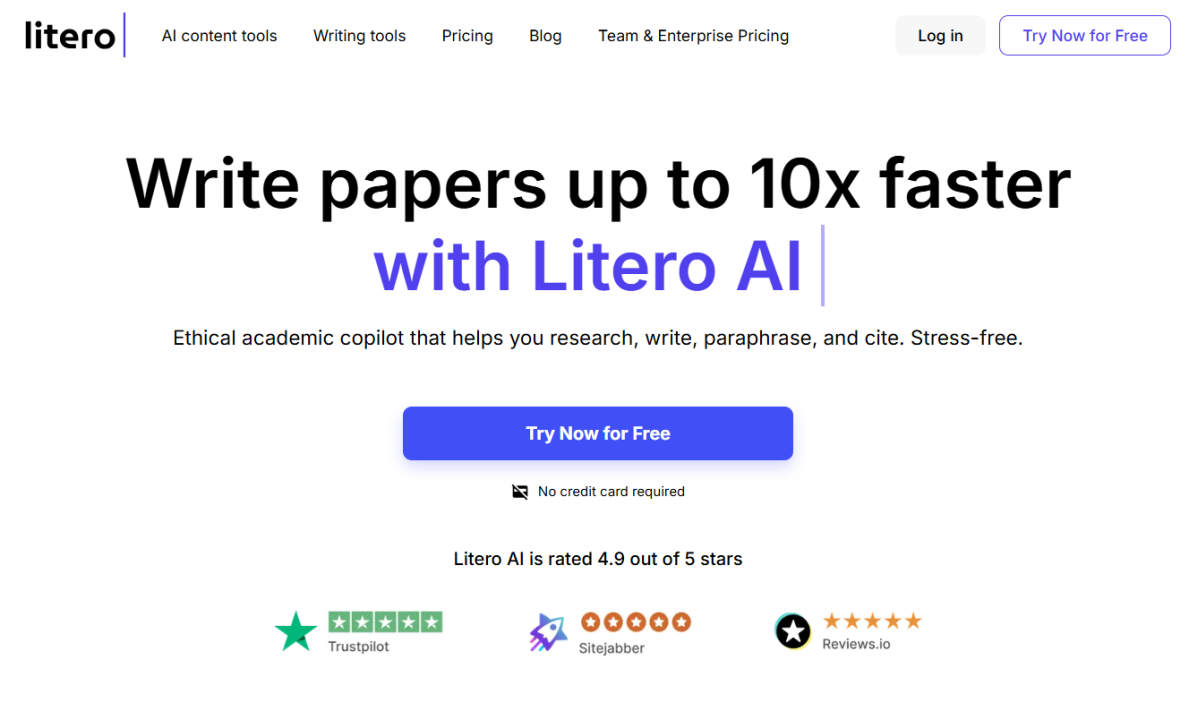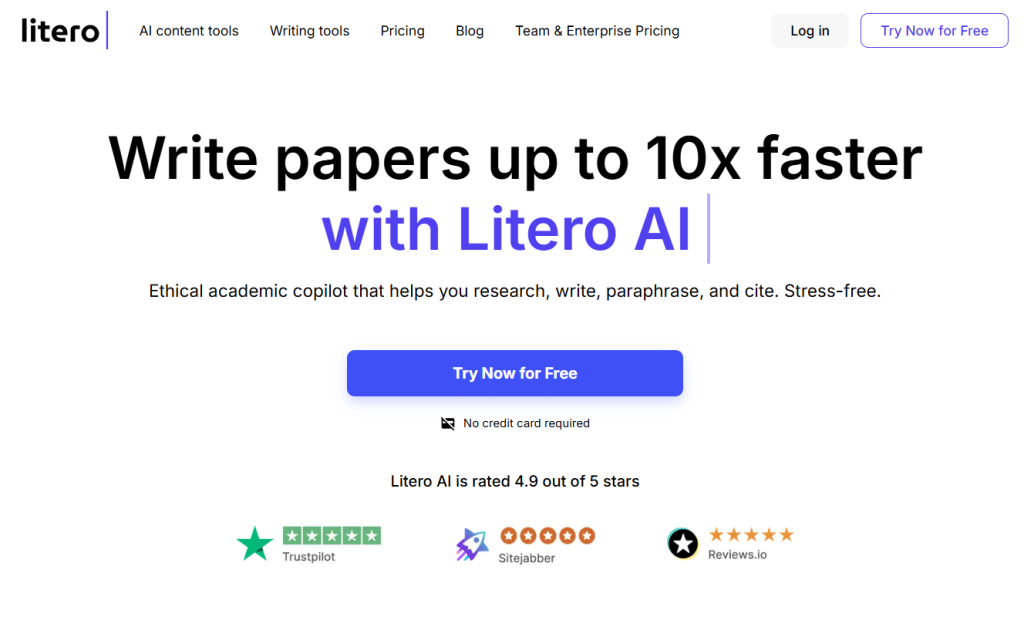Table of Contents
Introduction 1
The current AI writing landscape 2
Round 1: Meet the contenders 2
1️⃣ Jenni AI 2
2️⃣ ChatGPT 3
3️⃣ Litero AI 4
Round 2: Research capabilities, or where the magic happens 5
✅ Jenni AI’s research game 5
✅ ChatGPT’s research reality check 6
✅ Litero’s research revolution 6
Round 3: Writing quality and academic integrity 6
📍 The quality question 6
📍 The integrity factor 6
Round 4: User experience and learning curve 7
💡 Jenni AI: Smooth sailing 7
💡 ChatGPT: Instant gratification 7
💡 Litero AI: Powerful yet accessible 7
Comparison Table 7
The verdict: Why Litero AI takes the crown 7
Making your choice: The bottom line 8
The future of academic AI: What’s next 8
Your next steps: Getting started with AI academic writing 8
Conclusion: The AI writing revolution is here 9
Introduction
Picture this: it’s 2 AM, you’ve already had three cups of coffee, and that research paper deadline is breathing down your neck like a hungry dragon. Does that sound familiar? Welcome to the modern student struggle, where the battle isn’t just against procrastination – it’s about finding the right AI research paper writer that actually gets you results without compromising your academic integrity.
Here’s the thing: not all AI writing tools are created equal. Some students are still wrestling with basic chatbots that spit out generic stuff. At the same time, others have discovered specialized platforms that understand the nuanced world of academic writing. Today, we’re diving deep into three heavyweight contenders: Jenni AI, ChatGPT, and Litero AI.
After months of testing these tools across dozens of research projects (and countless late-night writing sessions), we’re here to give you the naked truth about which AI research paper writer deserves a spot in your academic toolkit. Spoiler alert: the winner might surprise you.
The current AI writing landscape
Let’s get real – the AI writing space has exploded faster than a student’s stress levels during finals week. But here’s what most people don’t realize: using a general-purpose AI for academic writing is like bringing a butter knife to a sword fight – technically, it’s a tool, but you’re probably going to lose. Because generic isn’t good enough.
Academic writing demands precision, proper citations and attribution, adherence to style guides, and the ability to sum up complex research. It’s not just about putting words together – it’s about crafting arguments that would make your professor nod in approval rather than reach for their red pen.
That’s where specialized academic AI tools come in. But with so many options flooding the market, how to choose the right one?
Round 1: Meet the contenders
1️⃣ Jenni AI
Jenni AI markets itself as the academic writer’s best friend, and honestly, it’s got some impressive credentials.
Jenni offers features like:
Citation management that actually works with multiple formats.Research assistance that can pull from academic databases.Plagiarism checking that is built right into the platform.Templates for various academic document types.
The interface feels polished, and the learning curve isn’t too steep. We’ve seen students produce solid first drafts using Jenni’s guided writing approach.
2️⃣ ChatGPT
We all know that ChatGPT is the tool that launched a thousand thoughts about AI taking over the world. While it wasn’t designed specifically for academic work, its sheer versatility has made it a go-to for many students.
Its strengths are these:
Conversational interface that feels natural.Broad knowledge base spanning countless topics.Creative problem-solving for complex questions.Zero learning curve – if you can text, you can use ChatGPT.
But here’s where things get tricky: ChatGPT’s general-purpose nature can be both a blessing and a curse in academic contexts. Even with the recent release of the GPT-5 model and its impressive improvements, the fundamental challenges stubbornly remain – hallucinations still persist in the system, creating fake citations and confidently stating incorrect facts that could ruin your academic credibility. While GPT-5 shows better reasoning capabilities, it still can’t access real-time academic databases or verify the accuracy of the sources, leaving you to play detective with every piece of information it provides.
3️⃣ Litero AI
Now, let us tell you about Litero AI – the absolute winner of this round in our humble opinion. After testing dozens of AI writing tools, Litero consistently delivers something different from the others: it actually understands the academic writing process from research to final citation.


What sets Litero apart:
Integrated research capabilities that connect directly to scholarly databases with up-to-date sources (2020-2025).Real-time fact-checking to maintain academic integrity and ensure accountability.Advanced citation automation that handles even the trickiest sources you may use.Subject-specific optimization that adapts to different academic fields.Built-in AI assistant Literka that offers brainstorming assistance and emotional support (we all need that from time to time, don’t we?)
Round 2: Research capabilities, or where the magic happens
When it comes to research capabilities, this is where we separate the contenders from the pretenders.
✅ Jenni AI’s research game
Jenni does a decent job with research integration. You can pull sources, and the platform helps organize them reasonably well. The citation features work most of the time, though we’ve noticed some hiccups with newer or more atypical sources. It’s solid, but not spectacular.
✅ ChatGPT’s research reality check
Here’s ChatGPT’s Achilles heel: we already mentioned above that it can’t actually access current databases or verify information in real-time. You’ll get eloquent responses based on its training data, but fact-checking becomes your responsibility entirely. For academic work, this is like playing Russian roulette with your GPA (and we strongly don’t recommend that).
✅ Litero’s research revolution
This is where Litero AI absolutely shines. The platform doesn’t just help you write – it actively assists in the research process. Need sources on climate change policies from the last two years? Litero can pull from academic databases, verify information, and even suggest related research you might have missed.
We’ve seen students cut their research time in half while actually improving the quality of their sources. One user even told us they discovered two breakthrough studies for their thesis that they never would have found manually.
Round 3: Writing quality and academic integrity
Now, let’s talk about the elephant in the room: academic integrity. Using an AI research paper writer shouldn’t mean sacrificing your ethical standards or risking your academic future.
📍 The quality question
Jenni AI produces solid academic writing with proper structure and tone. The output feels academic without being overly stiff. However, the writing can sometimes feel formulaic – like it’s following a template rather than developing unique thoughts.
ChatGPT can produce incredibly engaging content, but it often lacks the specific academic rigor required for research papers. The writing might be compelling, but it doesn’t always meet academic standards for evidence-based arguments.
Litero AI strikes the sweet spot between engaging and academically rigorous. The platform understands different academic writing styles and can adapt the output accordingly. What’s more important, it helps you develop your own voice and style rather than replacing them.
📍 The integrity factor
Here’s where Litero really stands out. Instead of simply generating the content for you, it guides you through the writing process while ensuring everything remains authentically yours. The platform includes:
Transparency features that show exactly how AI assistance was used.Originality verification to prevent accidental plagiarism.Source attribution that maintains proper academic credit.Writing process documentation for complete transparency.
Round 4: User experience and learning curve
We believe that nobody wants to spend hours learning a new tool when they should be writing their paper instead. So let’s take a look at the learning curves of these tools, shall we?
💡 Jenni AI: Smooth sailing
Jenni offers a clean, intuitive interface that most students pick up quickly. Its guided writing process helps structure your thoughts, and the templates provide a good starting point.
💡 ChatGPT: Instant gratification
ChatGPT wins points for simplicity. Type a question, get an answer. But for complex academic projects, this simplicity can become a limitation.
💡 Litero AI: Powerful yet accessible
Litero manages to pack sophisticated features into an interface that doesn’t overwhelm. The onboarding process actually teaches you better academic writing practices while you learn the tool. It’s like having a writing tutor built into your AI assistant.
Comparison Table
The verdict: Why Litero AI takes the crown
After extensive testing across multiple academic disciplines and writing scenarios, Litero AI emerges as the clear winner for serious academic work. Here’s why:
Superior research integration: While other tools treat research as an afterthought, Litero makes it central to the writing process. The ability to seamlessly move from research to writing while maintaining source integrity is unmatched compared to other platforms.Authentic academic voice: Litero doesn’t just generate academic-sounding text – it helps you develop your own academic voice while ensuring your arguments are well-supported and properly cited.Future-proof features: The platform continues evolving with updates that address real academic challenges. Recent additions like collaborative peer review and advanced plagiarism prevention show Litero’s commitment to the academic community.Ethical AI use: In an era where academic institutions are grappling with AI policies, Litero provides transparency and ethical guardrails that let you leverage AI power while maintaining integrity. For more information, you can check their AI in Education Codex.
Making your choice: The bottom line
Here’s our recommendation based on different use cases:
➡️ Choose Jenni AI if you need basic academic writing support and don’t require extensive research capabilities.
➡️ Choose ChatGPT if you’re doing creative or exploratory writing where academic rigor isn’t the primary concern.
➡️ Choose Litero AI if you’re serious about academic success, need comprehensive research support, and want an AI research paper writer that grows with your academic journey.
The future of academic AI: What’s next
The academic AI landscape is evolving rapidly. We’re seeing trends toward:
Better integration with institutional systemsMore sophisticated plagiarism preventionEnhanced collaborative featuresSubject-specific AI specialization
Thanks to its innovative features, Litero AI is already ahead of these trends, positioning itself as the platform that will define academic AI use in 2025 and beyond.
Your next steps: Getting started with AI academic writing
Are you ready to revolutionize your academic writing process? Here’s your action plan:
Identify your primary needs: Research support, writing assistance, or citation management?Start with a trial: Most platforms offer free trials – don’t hesitate to take advantage of them.Begin with smaller projects: Test your chosen tool on smaller assignments before tackling major papers.Develop your workflow: Integrate AI assistance into your existing writing process.Stay updated on policies: Keep track of your institution’s AI use guidelines and adjust your workflow accordingly.
Conclusion: The AI writing revolution is here
The question isn’t whether AI will transform academic writing – it already has. The real question is whether you’ll choose tools that enhance your academic journey or simply generate content that lacks your unique perspective and intellectual contribution.
As someone who’s witnessed the evolution of academic AI tools firsthand, we can confidently say that platforms like Litero AI represent the future of ethical, effective academic assistance. They don’t replace your critical thinking – they amplify it.
The 2025 academic landscape belongs to students who master AI as a research and writing partner, not a replacement. Choose your AI research paper writer wisely, and watch your academic performance soar while maintaining the integrity that defines true scholarship.
Ready to experience the Litero difference? Your next breakthrough paper is just a click away.

